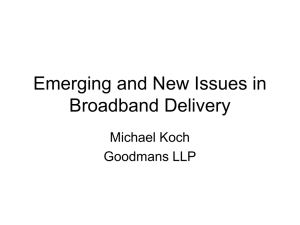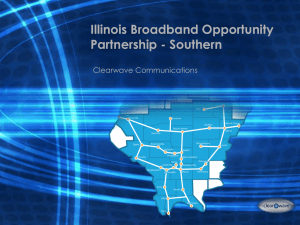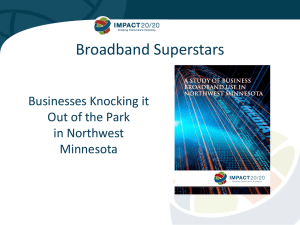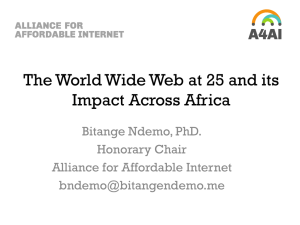the PowerPoint presentation
advertisement
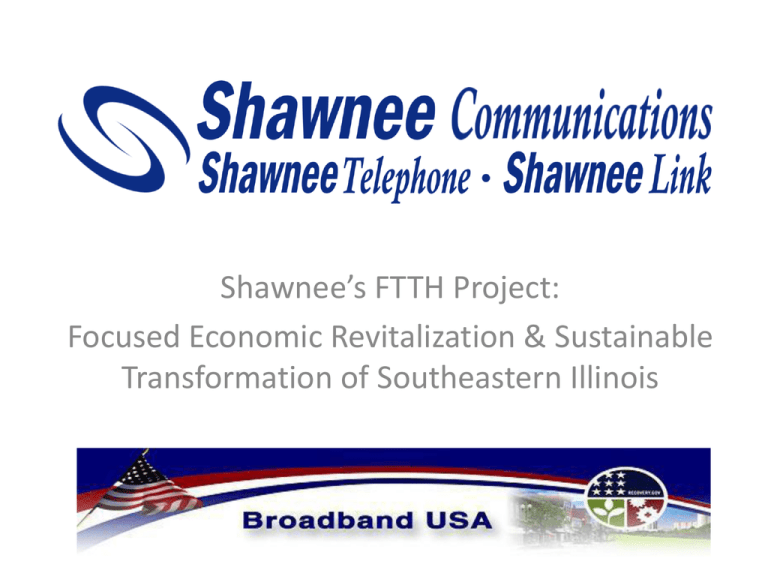
Shawnee’s FTTH Project: Focused Economic Revitalization & Sustainable Transformation of Southeastern Illinois Historical Background • Shawnee Telephone Company was originally incorporated in 1948 under the name of Equality Telephone Company. In 1966 Equality Telephone purchased Hardin County Telephone, and almost since inception Shawnee initiated its long and prosperous relationship with the Rural Electric Administration (REA) and Rural Utility Service (RUS). Background (cont.) • In 2005 Shawnee started to deploy FTTH technology into it’s ILEC service territory. • Today Shawnee’s service territory has expanded to over 90 Southern Illinois Communities. • Shawnee is reaching out to new strategic partners such as, ConnectSI , Partnership for a Connected Illinois, the Illinois State Board of Education, and the Governor’s Broadband Deployment Council. • We believe that by working together we can truly revitalize these economically depressed areas into highly productive communities in the future. Shawnee’s Southern Illinois Sustainable Broadband Transformation ARRA USDA Broadband Infrastructure Program Application • To provide an opportunity for transforming citizens in underserved low-income areas into highly productive communities by first empowering our communities with broadband technology. • We believe our proposal to develop a broadband network will create new jobs and economic growth, while stimulating innovations and investments. • Shawnee’s FTTH proposed network is capable of 100 Mbps transmission speed and is designed to serve 1,209 households, 438 businesses, and 35 anchor institutions, public schools, libraries, law enforcement, and medical care facilities. • We estimate the cost of this revitalization to be almost $10.0 million, $8.0 million of Shawnee investment and $2.0 million of grants, including $1 million of State of Illinois matching grant funds. Shawnee’s Southern Illinois Sustainable Broadband Transformation ARRA USDA Broadband Infrastructure Program Application • Shawnee requested a $8,352,929 Broadband Initiatives Program (“BIP”) loan-grant [(consisting of $1,000,000 State of Illinois matching Funds, a $6,249,989 loan (85%) and $1,102,940 grant (15%) • Our goal is to continue to deploy a Fiber-to-theHome (FTTH) broadband network capable of 100 Mbps transmission speed in our local exchange service area in rural southeastern Illinois. Shawnee’s Southern Illinois Sustainable Broadband Transformation ARRA USDA Broadband Infrastructure Program Application • The Challenges: • The lack of “broadband access” (100 Mbps); over 40% of the households identified in the application have no access to broadband technology, • This region sadly places at the top of all Illinois Poverty Summit indicators (poverty and community vulnerability). The “2007 Illinois Report on Poverty” places this region’s counties on the “Poverty Warning List.” • Recent worker dislocation events have increased the number of dislocated workers to over the last decade to over 4,000. • Finally, unemployment rates consistently exceed the federal rate and have done so for many years. Shawnee’s Southern Illinois Sustainable Broadband Transformation ARRA USDA Broadband Infrastructure Program Application • Providing a unique solution: A Fresh Outlook – Solutions to the Current Economic Crisis of the Local Community • Because of the topography of the land and dense forestation, fixed wireless does not consistently meet the minimum broadband standards adopted by the Federal Communications Commission. We have tried wireless and found it to be an ineffective solution; therefore, we have concluded an optical fiber to the home network capable of delivering 100 Mbps symmetrical broadband is the only sustainable long-term solution. • We believe in this initiative so strongly that beginning in 2005, prior to the ARRA funding availability, we secured RUS loan financing to build FTTH in three (3) communities, servicing 1,500 household and businesses. This first phase undertaking has recently been completed, and we are already seeing the benefit of the enhanced network. We know this is the correct long-term solution. Shawnee’s Southern Illinois Sustainable Broadband Transformation ARRA USDA Broadband Infrastructure Program Application Providing a unique solution: A Fresh Outlook – Solutions to the Current Economic Crisis of the Local Community • We will focus on the community anchors institutions of schools, health care, libraries, and community centers to ensure access for all citizens, even those without access to personal computer equipment. We will do this by working directly with the key institutions to identify their unique situations and by providing economic incentives in the form of discounted service offers to each of these community anchors • Based on market research, only 40% of the households have a home computer in this economically depressed region of the county. This is most likely due to the fact that in many cases over 20% of the population is living below the poverty level. Shawnee Telephone Company plans to address this fact head on. We will be offering a free home computer and discounted service plans to all qualifying low-income homes. • As a community leader in job creation and retention in this economical depressed area, we believe we have a social responsibility to these communities that goes beyond profits and job creation. We believe equal opportunity and access to broadband services will provide the education and creativity necessary to revitalize southern Illinois. Shawnee’s Southern Illinois Sustainable Broadband Transformation Shawnee’s Southern Illinois Sustainable Broadband Transformation Shawnee FTTH Objectives/Schedule • PHASE I : 2005 – 2010 initial FTTH Deployment in three communities with an investment of nearly twelve (12) million dollars. • PHASE II : 2011 ARRA Stimulus BIP Award Project FTTH buildout of five additional communities an additional ten (10) million. • PHASE III : 2012 – 2015 completion of remaining nine communities with estimated investment of thirty (30) million. • Total investment in Southern Illinois Broadband deployment over fifty-five (55) million with only two (2) million coming from grant sources! Shawnee’s Southern Illinois Sustainable Broadband Transformation Boring Machine in action Conduit Placement Shawnee’s Southern Illinois Sustainable Broadband Transformation April Showers – 4/28/2011 Fiber Distribution Hut May Flowers?? – 5/5/2011 Fiber Distribution Hut Shawnee’s Southern Illinois Sustainable Broadband Transformation Not everyone believes the vision • Regulators • Investment & Capital Community • Subscribers/Customers Shawnee’s Southern Illinois Sustainable Broadband Transformation Executive Summary • Shawnee is working towards comprehensive community enhancement that includes households, businesses, and community anchor institutions. • The availability of high-speed broadband service to households will give residents access to a plethora of new information and resources regarding employment, job training, education, and business opportunities, as well as additional sources of news, entertainment, and activities. • The availability of high-speed broadband service is an essential prerequisite for attracting new businesses to the area, as well as for permitting existing local businesses to expand the markets in which they sell their goods and services and in which they purchase necessary resources. Shawnee’s Southern Illinois Sustainable Broadband Transformation Executive Summary • Finally, the availability of high-speed broadband service is necessary to permit community anchor institutions (such as schools, libraries, medical facilities, and law enforcement agencies) to function at desired quality levels. For example, Shawnee plans to connect by fiber three local school systems to a local community college so that the local schools can cost-effectively expand their curricula to include college preparatory classes. Given that less than ten percent of PFSA residents presently have a college degree, Shawnee believes a broadband-enabled partnership between the local community college and high schools will encourage and enable local students to pursue college degrees and other further education, thereby increasing the education level and job skills of local residents and stimulating future economic growth.
